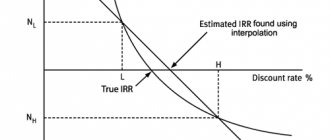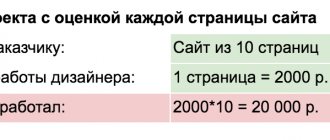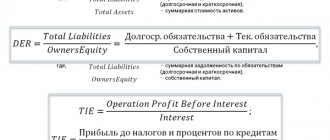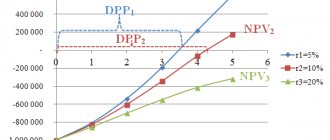Market price
The most important concept of valuation activity is the concept of market value. Federal Law 135-FZ “On Valuation Activities in the Russian Federation” gives the following definition of market value (Article 3. Concept of Valuation Activities):
“... the market value of the valuation object is understood as the most probable price at which this valuation object can be alienated on the open market in a competitive environment, when the parties to the transaction act reasonably, having all the necessary information, and the value of the transaction price is not affected by any extraordinary circumstances , that is, when:
- one of the parties to the transaction is not obliged to alienate the object of valuation, and the other party is not obliged to accept execution;
- the parties to the transaction are well aware of the subject of the transaction and act in their own interests;
- the valuation object is presented on the open market through a public offer, typical for similar valuation objects;
- the price of the transaction represents a reasonable remuneration for the object of evaluation and there was no coercion to complete the transaction in relation to the parties to the transaction on any part;
- payment for the valuation object is expressed in monetary form.”
According to this definition, it is clear that the value of an object is of a probabilistic nature, that is, it is subject to random fluctuations, and the value of the market value determined by an independent appraiser is only its most probable value. Simply put, if you order an appraisal from different appraisers, you will most likely receive different values. But how different can the results obtained by different evaluators be, provided that the research is done in good faith? Here everything depends on the object and the specifics of the market sector to which the object of assessment belongs.
For example, assessing the cost of an apartment in a standard building in Moscow will not yield large differences in the value determined by different appraisers. As a rule, in this case all discrepancies fall within 2-4%. This is due to the fact that standard apartments in Moscow are standardized objects in a developed market, i.e. in a market with a very large volume of transactions and offers for sale. Competition and information mechanisms of the market are doing their job and there are no large deviations in the assessment results.
But we can give examples of objects in the assessment of which these deviations can reach tens of percent. For example, such objects include rights to inventions. If the invention is not yet used in production or other areas of economic life, then the estimate of its value will be based on assumptions about its future use, and the introduction of any assumption makes the results of the estimate more subject to fluctuations. Even if different appraisers strive for maximum objectivity and validity of their assumptions, the introduction of assumptions will still lead to greater discrepancies in the value than when using actual market data.
Summarizing the discussion of the probabilistic nature of the market value, it should be noted that deviations in the value of the value are always present, but they are a consequence of the uncertainty of the market in relation to a specific object of assessment - the higher the uncertainty in the economic value of the object, the greater the fluctuations in the result of the assessment of the market value and the wider the interval, in which may contain the value of the total cost.
Let us note that Law 135-FZ “On Valuation Activities in the Russian Federation” (Article 7) contains the following norm:
“If ..... the specific type of value of the valuation object is not determined, the market value of this object must be determined. This rule is also subject to application in the case of the use in a normative legal act of terms not provided for by this Federal Law or valuation standards that define the type of value of the valuation object, including the terms “true value”, “reasonable value”, “equivalent value”, “real value” "and others."
That is, in all uncertain situations, the law gives preference to market value and directly prescribes its preferential use in valuation activities.
Do-it-yourself assessment or with the help of professionals
What is better - to do the assessment yourself or contact a specialized company? In most cases, the answer to this question will be to turn to professionals. Firstly, many appraisal tasks require a document from an independent appraiser who is a member of a self-regulatory organization of appraisers and has insured his liability. It is impossible to make such an assessment on your own.
Secondly, having appraisers on staff is expensive. The company does not need specialists of such qualifications on a permanent basis; they need to have specialized education and improve their qualifications at least once every three years in order to confirm their professional level.
If an assessment is required for internal purposes, for example, you need to calculate the value of a business as an indicator of management KPI for owners, then, of course, a professional appraiser is not needed, it is required. Then this indicator can be assessed by a qualified specialist from the company’s financial department.
Business valuation is an art form or branch of knowledge that uses rigorous mathematical methods and is based on premises, assumptions, forecasts and hypotheses. Therefore, the resulting figures are only guidelines, and not a guide to action or the final price. Business valuation, especially when performed by an independent professional appraiser, removes subjective factors and questions about possible manipulation of information. Without a reasonable analysis, without the guidelines provided by the assessment, it would be extremely difficult to arrive at the final price and transaction.
Types of value other than market value
In addition to market value, the Federal Valuation Standard “Purpose of Valuation and Types of Value (FSO N2)” provides a list of other main types of value used in valuation activities:
- investment cost;
- liquidation value;
- cadastral value.
It should be noted that this list of cost types is not exhaustive. If necessary, the appraiser can determine other types of value. In these cases, he is obliged to give a precise definition of the type of value used and justify the need for its use in this situation.
Investment cost
Investment value is the cost of an object in a specific investment project for a specific investor, taking into account his investment goals.
The main difference between investment value and market value is that it is determined when an object is used in some given investment project for fixed purposes of use, that is, it is a value not in exchange, but in use.
Investment value is most often used to assess the effectiveness of a project or to divide shares in investment projects, when the owner of the object and the investor are different persons and they want to regulate their relations on the basis of a fair division of future investment income.
How do market and investment values compare? Generally speaking, the investment value should always be greater than the market value, because if it is less, then there is no point for the owner of the property to participate in this project; it is easier for him to sell his property at the market price, in which case he will receive more money faster. Of course, as a result of the calculations, it may turn out that the investment value will be less than the market value - this means that an ineffective investment plan has been chosen.
Why conduct an economic assessment
The economic evaluation of investments is also called investment efficiency. By “economic assessment” we mean the compliance of marketing, technical, organizational, financial and other types of decisions with the goals and interests inherent in the project.
A competent and detailed investment plan will help you achieve your goals accurately and on time. If risks or problematic situations are identified, a preliminary assessment of investments will ensure the safety of funds and timely abandonment of dubious investment activities. An economic assessment of investments will provide an understanding of how the project implementation process will proceed and what difficulties may arise. This way, all project participants will have enough time to find the best way out of each difficult situation. In general, a preliminary assessment of investments will give an understanding of the prospects for the development of the project and the feasibility of investing in it.
If there are several projects, the results of the economic analysis will help the investor choose the most optimal option. The profitability indicators obtained from such an analysis are necessarily compared with government rates, for example, for a bank deposit. A project is considered attractive if it can offer more favorable conditions. Competing investments and their evaluation methods may differ, but the criteria for selecting the best option for investing your own funds will be the same for all projects. We will look at the most important indicators below.
Similar articles:
- signs of investment attractiveness
- how to draw up an investment agreement
- investment risks
An economic assessment should be carried out after the conclusion of the transaction, namely, during the implementation of the project. By accompanying all financial and technical processes throughout the entire life cycle of the project, the investor will be able to control what is happening and compare the results with those that were planned according to the preliminary plan. This will make it possible not to deviate from your goals and follow them as much as possible.
Liquidation value
Liquidation value is, in fact, the market value, but calculated under two extraordinary conditions - the period of time allotted for the sale of the property being valued is less than the average period of exposure of similar properties on the market and the sale of the property is forced.
The use of liquidation value is justified in cases where it is impossible to apply standard exposure periods for physical or legal reasons.
Consider a situation where a company is liquidated and sells off used office equipment. If a decision is made to liquidate the enterprise within, for example, the 1st week, then during this period it will obviously not be possible to sell office equipment at market value. In conditions of strictly limited sales periods, it is the liquidation value, and not the market value of the property, that should be assessed.
Also, calculating the liquidation value makes sense if the quick sale of old equipment will allow you to save on renting premises and employee salaries, and these savings will be greater than the difference between the market and liquidation value.
Note that the liquidation value is always less than the market value, but for objects with very high liquidity, that is, requiring very little time to sell, for example, shares listed on the stock exchange, the liquidation and market values can be equal - after all, on the stock exchange the liquidity of shares is almost instantaneous and the establishment strict sales deadlines here do not have time to have a negative effect on the price.
Where to buy a ready-made business
- Specialized online platforms with sales advertisements. More than 30 thousand ready-made companies are listed on Avito. There is everything - from online stores that give away practically nothing (in this case we are talking about selling only a website page), to gold deposits for a billion rubles. The popular service "BIBOSS" offers a choice of more than 10 thousand offers throughout the country. To obtain detailed information about the company, you need to contact the seller. Owners indicate in advertisements only information about monthly income and expenses. No more.
- Brokers are intermediaries between the seller and the buyer. They act in the interests of the one who pays the money (usually the seller). They do pre-sale preparation, place advertisements on trading platforms, conduct negotiations, and legally formalize the deal. Brokers are the same as realtors, but they work with businesses, not real estate.
- Direct seller. Great luck if the buyer has access to the seller. Without intermediaries, it is easier to get to the true reasons for the sale. There is no need to overpay interest to brokers. If you have experience in such communications, it may be easier to agree on the terms of the deal.
There are many offers for the sale of ready-made businesses. This is a market where sellers praise their goods, and in some cases try to “cheat” an inexperienced buyer. Therefore, it is advisable to seek help from professionals.
Cadastral value
Cadastral value is the market value of real estate, which is determined en masse by order of state or municipal bodies for objects registered in the state real estate cadastre. We emphasize that only authorized state bodies have the right to order an assessment of the cadastral value; other customers will not be able to do this.
If you do not agree with the value of the cadastral value of your property, you can challenge (clarify) it - either in a special commission for the consideration of disputes about the value of the cadastral value, or in court. To do this, you will need to order an assessment of the market value of real estate from an independent appraiser and submit the required set of documents to the commission or court.










